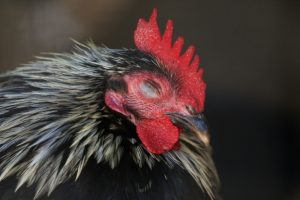Adding apple cider vinegar (ACV) to chicken water is popular among chicken keepers, and for good reason. This natural supplement offers several health benefits for your flock while being both cost-effective and easy to implement.
What Are the Benefits of Apple Cider Vinegar?
The natural acids in apple cider vinegar support chicken health in multiple ways.
- They help maintain a healthy digestive system by promoting good gut bacteria and creating an environment where harmful bacteria are less likely to thrive.
- ACV also contains important minerals and trace elements that can boost your chickens’ overall health.
- The acidity of ACV helps break down calcium and other minerals in your chickens’ feed, potentially improving nutrient absorption. This increased absorption efficiency means your flock can get more nutritional value from their regular feed, which is especially beneficial during high-demand periods like egg laying or molting.
Is Apple Cider Vinegar Safe for Chickens?
Raw, unfiltered apple cider vinegar with “the mother” (see below) provides the most health benefits.
Using metal containers with ACV water isn’t recommended because the acid can react with the metal over time. Instead, opt for plastic or ceramic waterers. Clean water containers regularly and replace the ACV solution daily, especially in warm weather when bacteria can multiply quickly.
How Much Apple Cider Vinegar should you Add to your Chicken’s Water?
When adding ACV to drinking water, the correct ratio is crucial for both safety and effectiveness.
Mix 1 tablespoon (15 ml) of apple cider vinegar per gallon (3.8 L) of water. This dilution ensures the water remains palatable (and your chickens will still drink it) while providing therapeutic benefits.
Adding too much ACV to the water isn’t necessarily unsafe, but it’s unlikely your chickens will drink water with high concentrations of vinegar. Instead, they might get dehydrated – a situation to avoid at all cost.
Should You Give ACV to Healthy Chickens?
While ACV offers various health benefits, it works best as part of a preventive care routine rather than a standalone treatment for serious health issues. Healthy chickens can receive ACV-enhanced water 2-3 times per week to help maintain good gut health and boost immunity.
Some chicken keepers increase the dosage of apple cider vinegar during particularly stressful periods, such as extreme weather changes or when introducing new flock members. The added support to the immune system during these times can help chickens stay healthy despite additional stress.
What Type of Apple Cider Vinegar Should You Use?
Raw, unfiltered apple cider vinegar with “the mother” provides the most health benefits for chickens. The mother refers to the cloudy, cobweb-like substance floating in the vinegar that contains beneficial bacteria and enzymes. While filtered ACV can still help maintain water cleanliness, it lacks many of the probiotic benefits found in raw versions.
Choose organic ACV when possible to avoid potential pesticide residues. Store-brand options work fine as long as they’re raw and unfiltered, though well-known brands are often reliable choices. Avoid apple cider flavoring or apple-flavored vinegar products, as these don’t offer the same benefits as real ACV.
Can Apple Cider Vinegar Help with Deworming?
Apple cider vinegar creates an environment that’s less hospitable to internal parasites and chickens who get ACV in their drinking water would not usually get worms. Combine it with a clean coop and feeder, a proper diet, and this natural parasite management strategy should prevent full infestation.
However, ACV shouldn’t be relied upon as the sole method of parasite control. The acidic environment ACV creates in the digestive system may help deter some parasites, but scientific evidence to support its effectiveness as a dewormer remains limited.
Find more ways to combat worms in your chickens in this article on iamcountryside.com – and always consult with a veterinarian when needed.
How Effective Is ACV for Treating Sour Crop?
Sour crop, a condition where food becomes stuck in a chicken’s crop due to a fungal or bacterial infection, can benefit from ACV supplementation as part of the treatment plan. The acidic nature of apple cider vinegar helps combat the fungal growth that is often associated with sour crop while at the same time promoting a healthy digestion.
However, severe cases of sour crop require immediate attention and possibly veterinary intervention. ACV can complement the treatment but shouldn’t delay seeking proper medical care when needed.
Can Apple Cider Vinegar Help with Coccidiosis?
While the acidic environment created by ACV is less favorable for coccidia, it’s not an effective treatment for coccidiosis infections. This serious condition requires specific anticoccidial medications for proper treatment. Apple cider vinegar can support overall gut health during recovery but should never replace appropriate medical intervention for diagnosed cases of coccidiosis.
Can you give Baby Chicks Apple Cider Vinegar?
Apple cider vinegar can be safely introduced to chicks once they’re 2 weeks old. If you’re not sure how much acv to give to baby chicks, start with a more diluted mixture of 1 teaspoon (5 ml) per gallon (3.8 L) of water. After the chicks reach 4 weeks of age, gradually increase to the standard adult ratio of 1 tablespoon per gallon.
During the first two weeks of life, chicks have particularly sensitive digestive systems. Their primary focus should be on proper starter feed and clean, fresh water. Once ACV is introduced, monitor the chicks carefully to ensure they’re drinking enough water and not showing any signs of digestive upset. If they seem to drink less (or not at all) when you add apple cider vinegar to their water, you can either try to add more water to the mixture – or switch back to plain water until they’re fully hydrated and you could try again at a lower dosage.
How Should You Start Using ACV?
Start slowly when adding apple cider vinegar to your flock’s water. Some chickens may be reluctant to drink water with an unfamiliar taste or smell at first; starting with a more diluted solution and gradually increasing to the full recommended ratio can help with acceptance.
Keep detailed records of when and how much ACV you’re adding to the water. This helps you keep a consistent schedule and makes it easier to monitor changes in the health or behavior of your flock.
How Do You Monitor Your Flock’s Response to Apple Cider Vinegar?
Pay attention to your flock’s response. While most chickens benefit from or remain neutral to ACV in their water, each flock is unique. Watch for changes in water consumption, egg production, or general behavior.
ACV supplementation works best as part of a comprehensive approach to your chickens’ health that includes proper nutrition, clean living conditions, and regular health monitoring. While apple cider vinegar offers valuable benefits, it’s just one tool in the broader toolkit of responsible chicken keeping.





0 Comments